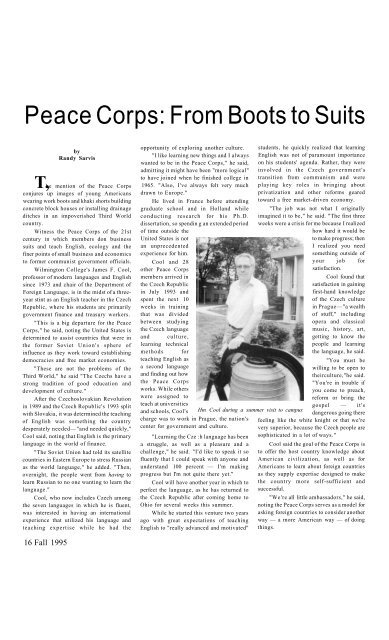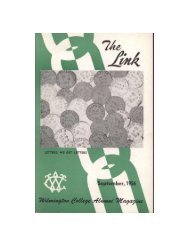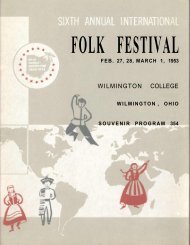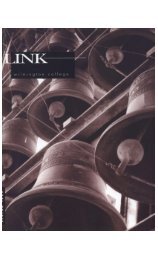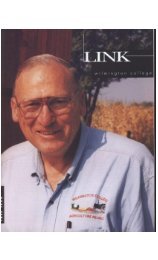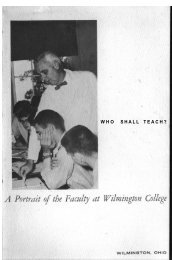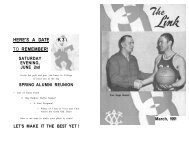Link 1995 10 (Vol. 45, No. 3).pdf - DRC Home - Wilmington College
Link 1995 10 (Vol. 45, No. 3).pdf - DRC Home - Wilmington College
Link 1995 10 (Vol. 45, No. 3).pdf - DRC Home - Wilmington College
Create successful ePaper yourself
Turn your PDF publications into a flip-book with our unique Google optimized e-Paper software.
Peace Corps: From Boots to Suits<br />
by<br />
Randy Sarvis<br />
T, he mention of the Peace Corps<br />
conjures up images of young Americans<br />
wearing work boots and khaki shorts building<br />
concrete block houses or installing drainage<br />
ditches in an impoverished Third World<br />
country.<br />
Witness the Peace Corps of the 21st<br />
century in which members don business<br />
suits and teach English, ecology and the<br />
finer points of small business and economics<br />
to former communist government officials.<br />
<strong>Wilmington</strong> <strong>College</strong>'s James F. Cool,<br />
professor of modern languages and English<br />
since 1973 and chair of the Department of<br />
Foreign Language, is in the midst of a threeyear<br />
stint as an English teacher in the Czech<br />
Republic, where his students are primarily<br />
government finance and treasury workers.<br />
"This is a big departure for the Peace<br />
Corps," he said, noting the United States is<br />
determined to assist countries that were in<br />
the former Soviet Union's sphere of<br />
influence as they work toward establishing<br />
democracies and free market economies.<br />
"These are not the problems of the<br />
Third World," he said "The Czechs have a<br />
strong tradition of good education and<br />
development of culture."<br />
After the Czechoslovakian Revolution<br />
in 1989 and the Czech Republic's 1993 split<br />
with Slovakia, it was determined the teaching<br />
of English was something the country<br />
desperately needed—"and needed quickly,"<br />
Cool said, noting that English is the primary<br />
language in the world of finance.<br />
"The Soviet Union had told its satellite<br />
countries in Eastern Europe to stress Russian<br />
as the world language," he added. "Then,<br />
overnight, the people went from having to<br />
learn Russian to no one wanting to learn the<br />
language."<br />
Cool, who now includes Czech among<br />
the seven languages in which he is fluent,<br />
was interested in having an international<br />
experience that utilized his language and<br />
teaching expertise while he had the<br />
16 Fall <strong>1995</strong><br />
opportunity of exploring another culture.<br />
"I like learning new things and I always<br />
wanted to be in the Peace Corps," he said,<br />
admitting it might have been "more logical"<br />
to have joined when he finished college in<br />
1965. "Also, I've always felt very much<br />
drawn to Europe."<br />
He lived in France before attending<br />
graduate school and in Holland while<br />
conducting research for his Ph.D.<br />
dissertation, so spendin g an extended period<br />
of time outside the<br />
United States is not<br />
an unprecedented<br />
experience for him.<br />
Cool and 28<br />
other Peace Corps<br />
members arrived in<br />
the Czech Republic<br />
in July 1993 and<br />
spent the next <strong>10</strong><br />
weeks in training<br />
that was divided<br />
between studying<br />
the Czech language<br />
and culture,<br />
learning technical<br />
methods for<br />
teaching English as<br />
a second language<br />
and finding out how<br />
the Peace Corps<br />
works. While others<br />
were assigned to<br />
teach at universities<br />
and schools, Cool's<br />
charge was to work in Prague, the nation's<br />
center for government and culture.<br />
"Learning the Cze :h language has been<br />
a struggle, as well as a pleasure and a<br />
challenge," he said. "I'd like to speak it so<br />
fluently that I could speak with anyone and<br />
understand <strong>10</strong>0 percent — I'm making<br />
progress but I'm not quite there yet."<br />
Cool will have another year in which to<br />
perfect the language, as he has returned to<br />
the Czech Republic after coming home to<br />
Ohio for several weeks this summer.<br />
While he started this venture two years<br />
ago with great expectations of teaching<br />
English to "really advanced and motivated"<br />
Hm Cool during a summer visit to campus<br />
students, he quickly realized that learning<br />
English was not of paramount importance<br />
on his students' agenda. Rather, they were<br />
involved in the Czech government's<br />
transition from communism and were<br />
playing key roles in bringing about<br />
privatization and other reforms geared<br />
toward a free market-driven economy.<br />
"The job was not what I originally<br />
imagined it to be," he said. "The first three<br />
weeks were a crisis for me because I realized<br />
how hard it would be<br />
to make progress; then<br />
I realized you need<br />
something outside of<br />
your job for<br />
satisfaction.<br />
Cool found that<br />
satisfaction in gaining<br />
first-hand knowledge<br />
of the Czech culture<br />
in Prague—"a wealth<br />
of stuff," including<br />
opera and classical<br />
music, history, art,<br />
getting to know the<br />
people and learning<br />
the language, he said.<br />
"You must be<br />
willing to be open to<br />
theirculture,"he said.<br />
"You're in trouble if<br />
you come to preach,<br />
reform or bring the<br />
gospel — it's<br />
dangerous going there<br />
feeling like the white knight or that we're<br />
very superior, because the Czech people are<br />
sophisticated in a lot of ways."<br />
Cool said the goal of the Peace Corps is<br />
to offer the host country knowledge about<br />
American civilization, as well as for<br />
Americans to learn about foreign countries<br />
as they supply expertise designed to make<br />
the country more self-sufficient and<br />
successful.<br />
"We're all little ambassadors," he said,<br />
noting the Peace Corps serves as a model for<br />
asking foreign countries to consider another<br />
way — a more American way — of doing<br />
things.


